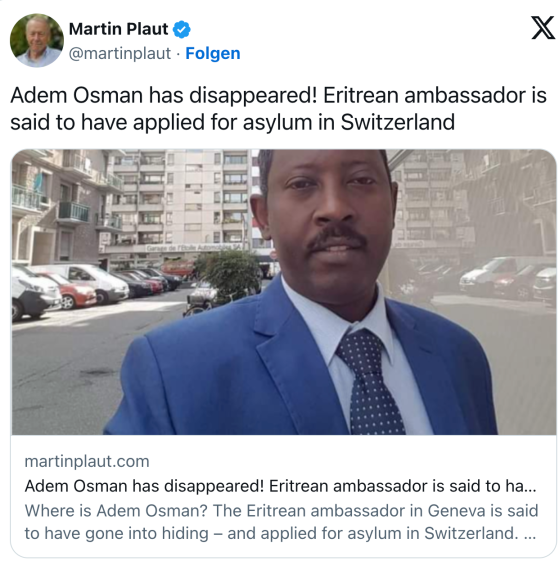Eritrea’s missing Swiss Ambassador tracked down
2023-09-10 19:53:41 Written by Martin Plaut Published in English Articles Read 2097 times
The "NZZ am Sonntag" has tracked down the Eritrean ambassador in Geneva who has allegedly disappeared and gone into hiding. The regime's lack of transparency and dubious information policy repeatedly lead to false reports and rumours. Source: NZZ Magazine Eritrea - a dictatorship of rumoursGeorg Humbel How can this be? Various newspapers reported this week that Adem Osman had left the embassy and disappeared. An Eritrean radio station in exile was the first to broadcast the news. Adem Osman is an internationally known figurehead of the regime in Asmara. He has appeared before the UN several times. This makes the news that he has virtually deserted all the more spectacular. The news spread like wildfire in the Eritrean exile community. Bloggers and later Swiss media jumped on the bandwagon and spread the news. Adem Osman has disappeared! Eritrean ambassador is said to have applied for asylum in Switzerland Wild stories immediately started to circulate among the Eritreans: Osman had taken a well-paid job at the UN, was one version. Quite wrong, others said: He had applied for asylum and was now living anonymously in a refugee centre in Ticino. Or a third version: Osman had fallen out with the regime. He had to go into hiding and was fleeing in panic. Osman is still ambassadorObviously, he is not. He is standing on the pavement in Geneva's Paquis district at midday on Friday, talking to this newspaper's reporter in a relaxed manner. "I am still working at the embassy," Osman says. Nothing has changed, everything is normal, the Eritrean diplomat emphasises. There is not enough time for a selfie, Osman says a friendly goodbye and continues walking with his companion towards Lake Geneva. It is not the first time that there are rumours around the Eritrean embassy in Geneva. What exactly is happening on Rue de Lausanne? Is the embassy collecting funds? Is it spying on the diaspora in Switzerland? Such questions pop up again and again. The fact that they remain unanswered is due to Eritrea's information policy. The embassy hardly talks to the Swiss media. Telephone calls are pointless, they always lead nowhere. Enquiries by e-mail remain unanswered. The embassy is thus following in the best tradition of the regime in Asmara. Government action in the East African country is highly non-transparent. There is no valid constitution. There are written laws - but they only apply to a limited extent. Unwritten guidelines are just as important. There is a permanent state of uncertainty. Political scientist Mirjam van Reisen does research on Eritrea at Tilburg University in the Netherlands. She is considered one of the best experts on the country. She says: "There are always a lot of rumours in Eritrea. No one knows anything for sure, so everyone is speculating." This is typical of a non-transparent dictatorship. The whole thing is fuelled by the fact that Eritrea is a strongly oral society and there is a tradition of drinking coffee and talking. This leads to rumours spreading extremely quickly. For example, rumours about the health of the autocrat Afewerki are constantly circulating. Sometimes he is deathly ill and close to his deathbed, then again he is in the best of health. Disinformation as a strategyVan Reisen, however, goes one step further. "The regime is deliberately using a strategy of disinformation," says the professor. The government is working to construct a "grey area". It is definitely in the regime's interest that it remains unclear what is true and what is false. "Even rumours and false reports have an impact if they are spread long enough," van Reisen says. This grey area surrounds Eritrea as a whole. Since refugee numbers from the East African country skyrocketed in 2006, Federal Berne has been puzzling over how bad the situation in the country really is. Refugees describe the country as hell on earth. As a kind of "North Korea of Africa". Bourgeois asylum politicians have long suspected that the situation in the country is not so bad. Which is true? As always in the case of Eritrea, it is difficult to find out. The country is isolated, and hardly any reliable information gets out - but all the more rumours. |





















